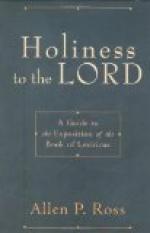But let us imagine that the same irreversibility applied to the conception of space—that is, that we could move through space only from north to south, and not in the opposite direction. Then a thing in space, as a house, would not exist for us until we approached it. When we were approaching it, it would first appear indistinctly, and more and more distinctly the nearer we approached it, just as an event in time does not exist until we reach the point of its beginning, but may appear in anticipation, in time perspective, when we approach it, the more distinctly, the closer we approach it, until we reach the threshold of the time span covered by the event, and the event begins to exist, the life is born. So to us, if we could move only from north to south, the house would begin to exist only when we reached its north door. That point would be the “birth” of the house. Passing through the span of space covered by the house—this would for us be its existence, its “life,” and when we stepped out of the south door the house would cease to exist for us, we could never enter it and turn back to it again—that is, it would be dead and extinct, just as the life when we pass beyond its end point in time. Thus birth and death, appearance and extinction of an event in time, as our life, are the same as the beginning and end point of a thing in space, like a house. But the house appears to us to exist permanently, whether we are in it, within the length between beginning and end point, or not; while the event in time, our life, appears to us to exist only during the length of time when we are between its beginning and its end point in time, and before and after it does not exist for us, because we cannot go back to it or ahead into it. But assume time were reversible, like space—that is, we could go through it in any direction. There would then be no such thing as birth or origin, and death or extinction, but our life would exist permanently, as a part or span of time, just as the house exists as a part or section of space, and the question of immortality, of extinction or nonextinction by death, would then be meaningless. We should not exist outside of the span of time covered by our life, just as we do not exist outside of the part of space covered by our body in space, and to reach an event, as our life, we should have to go to the part of space and to the part of time where it occurs; but there would be no more extinction of the life by going beyond its length in time as there is extinction of a house by going outside of its door, and everything, like a human being, would have four extensions or dimensions—three extensions in space and one in time.[9]
If space and time, and therefore the characteristics of space and time, are not real things or entities, but conceptions of the human mind, then those transcendental questions, as that of immortality after death and existence before birth, are not problems of fact in nature or outside of nature, but are meaningless, just as the question whether a house exists for an observer outside of the space covered by it. In other words, the questions of birth and death, of extinction or immortality, are merely the incidental results of the peculiarity of our conceptions of time, the peculiarity that the time of our conceptions is irreversible, flows continuously at a uniform rate in the same direction from the past to the future.




